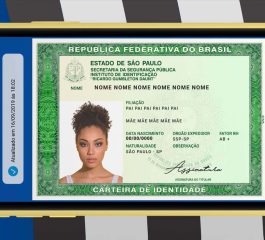[botao link={https://www.gov.br/pt-br/servicos-estaduais/solicitar-cnh-social} text={Request Free Social CNH} corfundo={#af2626} corletra ={#fff}]
As it allows them to face the challenges associated with registering official documents. The CNH has a set of rights and privileges linked to it.
Which allows its users to enjoy a series of benefits, such as the possibility of accessing social programs.
Important features of the CNH Social
Prove identity to obtain jobs, open bank accounts, perform notary services, weddings, among others.
In addition to these benefits, the free driver’s license has also been used as a means of preventing fraud or abuse.
The creation of the wallet prevents users from falling victim to scams by providing a certificate that provides proof of the link between the wallet holder and the declared personal identity.
With a free driving license, interested parties can obtain rights and privileges that help them establish a better future.
In this way, it can be said that the CNH represents a milestone in Brazilian history, guaranteeing civil rights for all Brazilians.
Who can participate in CNH Social 2023?
The Benefit of the National Social Driving License is intended for people with disabilities, the elderly, young people at the beginning of their professional careers.
And students enrolled in higher education or technical education institutions.
The requirements for participation are:
- Have gross monthly family income of up to 3 national minimum wages,
- Registration in the Single Registry for Social Programs of the Federal Government (CadÚnico).
And proof of deficiency, depending on the registration category. The documents required for the request are:
- Identification card and CPF,
- Proof of residence for the last three months,
- Proof of income
- And, in some cases, medical reports and exams.
After registration, Mapa Digital da Diversidade organizes, in partnership with universities, integration courses to prepare the registered person for the benefits of the card.
Then, after approval of the information, the benefit is granted.
How to register for Social Benefit
To register for the social benefit of the National Driving License, the interested party must contact the National Traffic Agency (Denatran).
And fill out a license request form. The form will include some personal information, such as name and identification document.
It is mandatory for the interested party to have a government-issued identification document, such as an identity card or passport.
In addition, it is also necessary to present proof of residence, which must comply with the data on the registration form.
Approval of the license application depends on the information provided, therefore, it is important that the data is checked before filling out the form to ensure compliance with the rules.
After approval of the request, the applicant will receive their National Driving License (CNH), which will entitle them to the associated social benefits.
Among the benefits, we highlight the exemption from fees for the first vehicle registration, the reduction of points on the Driver’s License for self-taught drivers.
And the discount on fines provided for by the Brazilian Traffic Code.
Benefits and advantages of the social driver’s license 2023
Social qualification is a document issued by the federal government that provides citizens with immediate access to incentives, benefits and advantages, such as discounts on public services.
Opening bank accounts, passports and birth certificates, issuing proof of INSS registration, access to health units and various other benefits for those who have this document.
The benefits and advantages provided for those who have this card include discounts on postal services, advantages for purchasing books and commerce in general.
Exemptions from public service fees, opening a bank account and granting financing at special interest, among other advantages.
In addition, it also grants labor rights, access to basic health units and facilities for obtaining important documents, such as a military enlistment certificate.
The requirements for obtaining a social driving license vary depending on the socioeconomic status of the applicant.
The document is also subject to changes and to the rules established by the federal government.
Final considerations
The National Social Driving License 2023 has been presented as an important work to build a more robust and inclusive social protection system.
It aims to provide adequate benefits through a systematic contribution commitment and can ultimately help governments recognize and support the untapped workforce in the job market.
With the National Social Driving Card 2023, people with lower income will have greater financial security, as well as more flexibility in managing their finances.
The information contained in the CNH 2023 will be even better organized and accessible to the responsible authorities.
However, greater commitment will be needed to ensure that policies effectively support the social system.
The success of this project will only be possible through the combined adoption of a systematic commitment to contribute.
It is important that national governments consider financing the system and promoting participation by providing incentives to public and private partners.
The important thing is to prioritize the elements of the portfolio that are fundamental to ensuring the rights to social protection of people with fewer resources.



